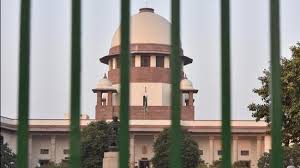(A) Code of Criminal Procedure, 1973 – Section 389 – Suspension of sentence – Acid attack – Non-application of mind – relevant factors – Seriousness of offense. The Supreme Court considered quintuplet appeals where the victim of an acid attack challenged the suspension of sentence of life imprisonment of the convicted persons and their consequential enlargement on bail. The Court emphasized the importance of Section 389 Cr.PC, which requires careful consideration and recording of reasons for the suspension of sentence and grant of bail pending appeal.
The Court cited various precedents highlighting that suspension of sentence and grant of bail should not be routine matters but should be based on objective assessment and consideration of relevant factors.
It was observed that in cases involving serious offenses like acid attacks, the nature of the offense, severity of punishment, and other relevant factors must be carefully considered before suspending the sentence and granting bail.
The impugned judgment, in this case, was found to be infected with non-application of mind and failure to consider the seriousness of the offense. The Court held that the offer of compensation and the delay in appeal listing cannot be the sole grounds for granting bail in such cases.
Consequently, the impugned order was set aside, and bail granted to the private respondents was cancelled. The appellants were directed to surrender before the trial court within four days for committal to judicial custody, failing which the private respondents would be rearrested and committed to custody. (Para 13)
(B) Suspension of sentence in heinous crimes – Validity of offering compensation for suspension of sentence – Suspension of Sentence – Acid Attack – Victim Compensation – Validity of Offer, Bail Cancellation – Blood Money – Criminal Justice System – The case pertains to the suspension of sentence in an acid attack case, where the victim suffered severe disfigurement. The High Court initially directed suspension of sentence based on an offer of compensation made by the convicts, but the victim refused to accept it.
The convicts offered compensation to the victim as a condition for suspension of sentence. However, the victim’s refusal to accept the compensation raised questions about the validity of such an offer. The court noted that offering compensation, akin to “Blood Money,” for suspension of sentence is not acceptable in the criminal justice system.
The court emphasized the importance of considering supervening circumstances for the cancellation of bail. It cited precedents outlining the grounds for bail cancellation, including misuse of bail, tampering with evidence, or threat to witnesses. The High Court’s decision to grant bail based solely on the offer of compensation was criticized for not considering relevant factors. (Para 27)
(A) Code of Criminal Procedure, 1973 – Section 389 – Suspension of sentence – Acid attack – Non-application of mind – relevant factors – Seriousness of offense. The Supreme Court considered quintuplet appeals where the victim of an acid attack challenged the suspension of sentence of life imprisonment of the convicted persons and their consequential enlargement on bail. The Court emphasized the importance of Section 389 Cr.PC, which requires careful consideration and recording of reasons for the suspension of sentence and grant of bail pending appeal.
The Court cited various precedents highlighting that suspension of sentence and grant of bail should not be routine matters but should be based on objective assessment and consideration of relevant factors.
It was observed that in cases involving serious offenses like acid attacks, the nature of the offense, severity of punishment, and other relevant factors must be carefully considered before suspending the sentence and granting bail.
The impugned judgment, in this case, was found to be infected with non-application of mind and failure to consider the seriousness of the offense. The Court held that the offer of compensation and the delay in appeal listing cannot be the sole grounds for granting bail in such cases.
Consequently, the impugned order was set aside, and bail granted to the private respondents was cancelled. The appellants were directed to surrender before the trial court within four days for committal to judicial custody, failing which the private respondents would be rearrested and committed to custody. (Para 13)
(B) Suspension of sentence in heinous crimes – Validity of offering compensation for suspension of sentence – Suspension of Sentence – Acid Attack – Victim Compensation – Validity of Offer, Bail Cancellation – Blood Money – Criminal Justice System – The case pertains to the suspension of sentence in an acid attack case, where the victim suffered severe disfigurement. The High Court initially directed suspension of sentence based on an offer of compensation made by the convicts, but the victim refused to accept it.
The convicts offered compensation to the victim as a condition for suspension of sentence. However, the victim’s refusal to accept the compensation raised questions about the validity of such an offer. The court noted that offering compensation, akin to “Blood Money,” for suspension of sentence is not acceptable in the criminal justice system.
The court emphasized the importance of considering supervening circumstances for the cancellation of bail. It cited precedents outlining the grounds for bail cancellation, including misuse of bail, tampering with evidence, or threat to witnesses. The High Court’s decision to grant bail based solely on the offer of compensation was criticized for not considering relevant factors. (Para 27)
SUPREME COURT OF INDIA
2024 STPL(Web) 292 SC
[2024 INSC 343]
Shivani Tyagi Vs. State Of U.P. & Anr
Criminal Appeal Nos.1957-1961 of 2024 (Arising out of SLP(Crl.) Nos.3484-3488 of 2024)-Decided on 2-4-2024
https://stpllaw.in/wp-content/uploads/2024/04/2024-STPL_Web_-292-SC.pdf







